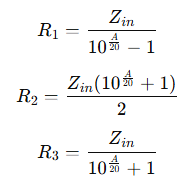This calculator helps you determine the values of the resistors R1 and R2 to be used for a bridged-tee attenuator.
Inputs
Outputs
A Bridged-Tee Attenuator is a passive circuit used in both RF and audio systems to reduce the power of a signal without distortion. It consists of a series combination of resistors and is often used in situations where a precise level of attenuation is required while maintaining proper impedance matching. The Bridged-Tee configuration is known for its simplicity and efficiency in signal level adjustment.
This Free Online Bridged-Tee Attenuator Calculator allows engineers and designers to quickly calculate the values of the resistors in the circuit for a desired level of attenuation, helping streamline the design process.
Why Use This Calculator?
The Bridged-Tee Attenuator Calculator offers several advantages for RF and audio circuit designers:
- Fast and Accurate Calculations: Quickly compute the necessary resistor values for the Bridged-Tee attenuator based on input parameters like desired attenuation and impedance.
- Easy to Use: A user-friendly interface that allows simple input of attenuation levels and impedance values to generate results with minimal effort.
- Versatile Application: Suitable for both RF and audio applications, making it a useful tool across various industries.
- Ensures Impedance Matching: The calculator helps ensure proper impedance matching, minimizing signal reflections and power loss.
- Completely Free and Accessible: No installation or registration is required to use the tool, making it convenient and cost-effective.
How to Use the Bridged-Tee Attenuator Calculator
Using the Free Online Bridged-Tee Attenuator Calculator is simple and straightforward:
- Input the Desired Attenuation (in dB): Enter the amount of signal attenuation you wish to achieve in the circuit.
- Specify the Input and Output Impedance: Input the impedance values (typically 50 ohms for RF circuits or other values depending on your application).
- Click Calculate: The calculator will instantly provide the required resistor values (R1, R2, and R3) for the Bridged-Tee attenuator configuration.
Formula
The resistor values for a Bridged-Tee Attenuator are calculated based on the following formulas:
- R1: The series resistor at the input, which contributes to the overall attenuation.
- R2: The shunt resistor, placed between the input and output, directly affecting the level of attenuation.
- R3: The second series resistor that provides impedance matching between the output and the load.
The formulas used to calculate the resistors are as follows:

Where:
- A is the desired attenuation in dB.
- Zin is the input impedance of the system.
These equations allow you to determine the appropriate resistor values to achieve the desired attenuation while ensuring proper impedance matching.
Applications of the Bridged-Tee Attenuator Calculator
The Bridged-Tee Attenuator Calculator can be used in a variety of applications across different fields:
- Signal Level Adjustment: It is primarily used to adjust signal levels in RF and audio systems without distorting the signal, providing a clean and stable output.
- Impedance Matching: Ensures that the input and output impedances are properly matched, which is critical for preventing power loss and signal reflections.
- RF Network Design: It is essential for designing and optimizing RF networks where attenuation is required, such as in communication systems, satellite systems, and broadcast equipment.
- Audio Systems: In audio systems, it helps control signal strength between different components such as amplifiers, preamps, and mixers.
- Test Equipment: Useful in calibration and testing equipment, where precise signal attenuation is required to measure device performance accurately.
Also Check:
- T-Pad Attenuator Calculator
- Balanced Attenuator Calculator
- Pi Attenuator Calculator
- Reflection Attenuator Calculator
Check Electronics Calculators that you can use for free.







